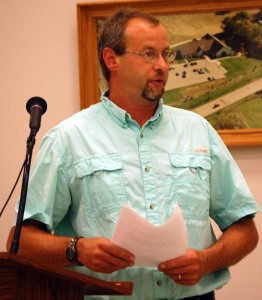A proposal to bring a sex offender residency restriction ordinance to Salem dominated the early part of what promised to be a lengthy meeting.
Several citizens spoke when asked to say what should be in such an ordinance. Among citizen suggestions are:
- Longer sentences for sex offenders
- Requiring sex offenders to leave in treatment homes where they can be closely supervised.
- Not allowing multiple sex offenders to live in the same home.
- Better notification of when sex offenders move in.
- Limits of how far from places where children congregate sex offenders can live or visit.
- That sex offenders have to register with the town before being able to move in.

Resident Jeff Miller address Monday's Salem Town Board meeting about the need for regulating where convicted sex offenders can live.
“I was appalled to learn our town has no ordinance … to prevent sex offenders from living here…” resident Jeff Miller said.
Chairman Linda Valentine said the town would pursue incorporating as many of the suggestions as possible as well as working with ordiances already passed by Paddock Lake and Silver Lake.
But Valentine also cautioned residents to not depend too much on ordinances and to be vigilant.
“It’s up to us to be aware of our surroundings,” Valentine said.
Sheriff David Beth, who was at the meeting to make a presentation about the town contracting with the Sheriff’s Department for additional patrol, amplified the problem of passing such an ordinance that is constitutional. He cited a conversation with Attorney General JB VanHollen, in which Van Hollen said all such ordinance he has seen are flawed.
“The attorney general has never seen one that is constitutional,” Beth said.
Valentine said an ordinance taking into consideration resident suggestions and concerns could eb ready by next month.
In the meantime, public safety officer David Shortess said he would be willing to lead a workshop for the public about how those most concerned with sex offenders living in their neighborhoods could help to make a case that a placement might be in violation of state regulations. Beth suggested a representative of the state Department of Corrections, who actually supervises released sex offenders, should alos be involved in such a meeting.
A date for the meeting was not set. Shortess also encouraged people to contact him with their ideas via email.
Beth also sought to ease concerns of those that live near sex offenders by saying that crimes against neighbors are extremely rare. More typically, sex offenders work themselves into the confidence of a family to then gain access to children they molest.
“I don’t disagree with a single person up there,” Beth said. “I’m just trying to ease your fears.”




The constitutionality of sex offender ordinances remain largely unaddressd in the State of Wisconsin according to a brief conversation I had with the Kenosha County sheriff, David Beth. It is my understanding from speaking with an attorney who specialized in constitutional law that local ordinances can be thrown out in entirely by a court of law, with possible injunctions awarded to the plantiff or plantiffs.
Unconstitutional laws found to be “vague” means the words chosen to rectify the matter written into the body of the law are unable to rectify the problem at hand. A law that is “ambiguous” means the words used to rectify the problem at hand are subject to more than one interpretation by a reasonable, prudent person (one who seeks a commonly-used dictionary for clear interpretation of a word meaning). and, a law found to be “overbroad” means the words used oversteps “protecting the greater public good in the least restrictive manner possible”.
If an unconstitutional law lacks an adequate “severance clause” to allow the remainder to stand “as is” and remain enforceable, the entire thing can be struck down and possibly necessitate the re-writing thereof. Plus, a court could award “injuctions” to the plantiff upon the defendant, thus requiring a municipality to pay huge sums of money on a per day basis until such time the municipality completes some act or conducts some action to allow the wronged plantiff whatever it is the court decided is within their constitutional right to have or do. This in turn can cause a “house made out of a deck of cards” collapse for other municipalities having such a similar law on their books.
the proper crafting of a legal, enforceable ordinance would require inclusion of specific exemptions or “words of art” as some might call it, so as to allow the law to be deemed constitutional. The problem is in finding a proto-type or model that could be used in part or in whole to withstand any “dilgent and zealous” challenge.